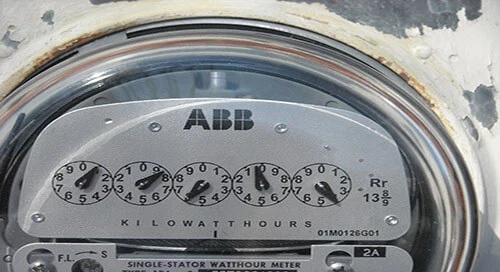For businesses, especially larger ones, electricity consumption is of crucial importance. How much you pay for business energy and how to get the best deals can be tough to wrap your head around. New metering systems such as a half-hourly meter can make a sizeable impact on your energy bill. If you’re part of a large business, you have likely already come across them.

In this short guide, we will be explaining what a half-hourly meter is and how they work. Plus, we will answer common questions such as what benefits there are to using a half-hourly meter. Figuring out how these meters affect your energy bill is the first step to reducing unnecessary costs for your business!


What is a half-hourly meter?

Also known as a ’00’ meter or a HH meter, the half-hourly meter works by taking meter readings every half hour. The process is automated and monitored by the electricity supplier, freeing up time and labour on the business owners behalf.
Businesses that consume high amounts of electricity use half-hourly meters to get regular and accurate energy consumption readings. Instead of getting just one reading over a whole day, there is a stream of data that accurately pinpoints electricity consumption.
How do half-hourly meters work?
It is as simple as the name states; half-hourly meters are automatically read by the energy supplier every 30 minutes, 24/7. Using AMR (automatic meter readings), the usage is recorded without the hassle of manually taking your readings.

The service is done by the supplier or a third party with accreditation. An HH meter operator will install and maintain the meter, then ensure that the communications equipment works correctly and sends the data to the data collector.
Which businesses need a half-hourly meter?
Larger companies that use a lot of energy, such as factories or offices, should switch to electricity readings every half hour. A business is required to swap when they consume at least 100,000 kWh of electricity each year. Put another way, your maximum consumption within a half-hour period would have to exceed 100 kWh.
According to P272 Regulation, if your meter is in the profile classes 05-08, it is mandatory to have half-hourly metering on the premises. Ofgem brought in this regulation, and it applies to all new contracts and any upcoming contract renewals.
Businesses with an electricity demand of 70 kWh or above can also choose to switch to half-hourly electricity readings, but it is not compulsory. Smaller business owners often choose half-hourly metering due to the invaluable regular access to their energy consumption data.
Smaller companies often consider this form of metering so they can avoid being saddled with substantial charges from their meter only being measured once a day at the height of use!
Find a business energy supplier today
Using Business Energy UK, you can compare prices from a wide selection of suppliers, negotiate the best deal for your energy needs and cut those bills down. Simply switching your electricity meter without shopping for the best deals means you could be paying far too much for your business energy.

If the contract renewal is coming up, or you are looking to adjust your metering situation, get a free energy quote for your business. Business Energy UK experts work to find competitive business electricity rates and arrange a perfectly tailored electricity usage plan based on facts and figures, not estimation.
Alternatively, you can call 0800 464 7677 to directly speak to an energy expert who will guide you through the process.
Frequently Asked Questions
The best part of a half-hourly meter is that you do not need to read it. The meter is read by a third party (your energy provider), so your supplier has a detailed log of accurate and up-to-date energy usage readings. You can access this data at any time and will receive a detailed breakdown of your bill.
For many companies, a half-hourly meter results in a more efficient workday as you do not need to check the meter periodically. Via a phone line, the companies meter is read consistently in half-hour periods and automatically recorded by the supplier. This is a dramatic shift from companies having to delegate time and labour towards taking these readings.
Half hourly billing is also tailored to the business’s specific requirements and usage. With the consumption data recorded every half hour, there is a much more precise image of usage. This eschews the estimated billing that is ordinarily applied when there isn’t an AMR system in place.
Not only does accuracy save companies money, but it helps paint a clearer image of the nation’s energy use. With more and more businesses tracking every half hour, the UK is developing a smarter electricity network that emphasises actual business needs.
As well as immediate benefits like saving money, the data that these meters produce is indispensable. Regular readings mean that your company has a detailed log of energy usage that can be used to operate the business more efficiently and reduce any unnecessary consumption. You will be able to see the peak and quietest hours of electricity usage and implement any strategies around this.
Let us not forget how crucial this information is in negotiating future energy plans. Being armed with an archive of information on the company’s energy consumption is how Business Energy UK experts can find you the best deal.
There is no set price for a companies energy bill – every business is different and will have its specific energy needs. As electricity prices shift regularly, based on the fluctuating energy market, it is important to find the right supplier who can offer your business a rate that you feel is competitive.
When looking to switch plans and reduce energy costs, many focus on the unit rate. This is something an accurate energy bill assists in as it gives you the necessary data to negotiate plans with energy suppliers when you want to switch. Organising a thorough pricing plan with energy suppliers can drastically cut the amount your business will be required to pay for electricity.
These are both examples of measurement classes for electricity consumption. Measurement classes signify the level of demand the consumer needs and are used to decide upon the metering system required. Generally non-half hourly is domestic and a smaller consumption, whereas half-hourly profile classes are for non-domestic customers with larger energy use.
Find out which one your business is and get in touch to see just how much you should be paying for your companies electricity consumption!



